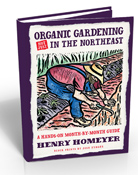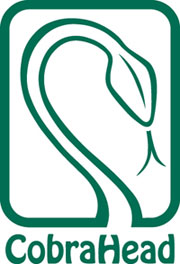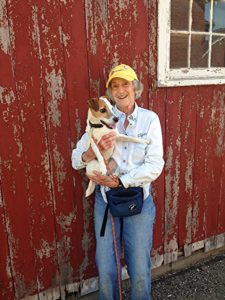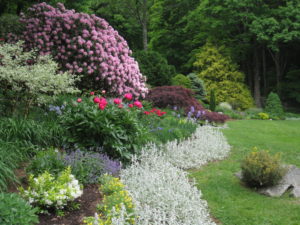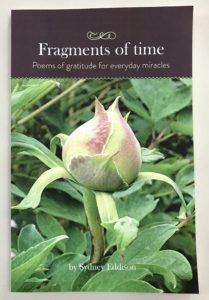Books by Sydney Eddison
Photos: K Day Designs
I’m a fairly simple person. I like dogs and flowers and good food. Having friends is important. I like to grow vegetables from seed, and I revere trees that have survived longer than I have. And when it comes to poetry, I like it simple and direct, poetry that evokes images of nature and emotions I can understand. So it was a great pleasure when my friend the garden writer Sydney Eddison sent me her new book of poetry, Fragments of Time: Poems of gratitude for everyday miracles (Pomperaug Valley Press, 2016).
Fragments of Time is a lovely book of poems, many that focus on Ms. Eddison’s gardens and her love for the outdoors. But a few are love poems about her late husband, one is a sad reminder of the Newtown School shooting which occurred in her town. Others are happy memories of children, dogs, squirrels and seasons changing. These are poems I have enjoyed reading out loud to loved ones.
You might relate to this fragment of a poem:
Dandelions, bold and unapologetic,
seize empty spaces between perennials
and drive down taproots.
The lines are drawn.
Let the battle begin!
I know Sydney Eddison best as a gardener and garden writer. I first visited her in 2000 after I read her book, The Self-Taught Gardener: Lessons from a Country Garden (Viking/Penguin, 1997) and knew she was someone I wanted to meet. The book taught me much – even though I was at the time already writing a gardening column and considered myself a fairly accomplished gardener.
Thumbing through it now, I see I can learn from it even now – and should re-read it. For example, she points out that most silver-leafed plants do best in dry soil. I never thought of it that way.
When I first visited Sydney in her garden in Connecticut it was in the middle of a ferocious drought. There was a ban on watering plants and washing cars, and had been for six weeks. Yet the soil in her flower beds was fluffy and lightly moist. Oaks in the woods were showing signs of stress, but her gardens were not. Had she been cheating, I asked?
“Not a bit,” she replied. She explained that for decades her husband, Martin, had been chopping up fall leaves with the lawn mower and storing them in the barn in bags until spring when she used them as mulch. The 3-inch layer held in moisture and protected the soil from the summer sun. Earthworms love them, too, she said. Like all her advice, this was given out in the spirit of a friendly auntie who wanted the best for you. I’ve been mulching with chopped leaves ever since.
Her book The Gardener’s Palette (Contemporary Books, 2003) taught me the basics of color theory. Among other things, it explains the importance of the color wheel and understanding the principles of contrast and harmony. It has color photos on nearly every page to illustrate her points. I agree with her final synopsis:
“With nature providing an abundance of soft, neutral tones and peace-keeping green leaves, no gardener with keen eyes can go that far wrong. And at the risk of oversimplifying a complex subject, I still maintain that color for gardeners isn’t so complicated after all.”
Then in 2005 Sydney came out with Gardens to Go: Creating and Designing a Container Garden (Bulfinch Press, 2005). As she explained in the beginning, “In terms of design, a container garden should have boundaries, bone structure, and geometry, just like any other garden.” She added, “As you will soon see, a container garden is the real thing, a living three-dimensional picture, rich in plant material every bit as exciting as an in-the-ground garden.”
Sydney’s most recent gardening book, Gardening for a Lifetime: How to Garden Wiser as You Grow Older (Viking Press, 2010) is, perhaps, her final gardening book. Written as she approached the age of 80, she recognized that she was no longer strong as on ox and able to wrestle boulders out of the ground. That a paid helper in the garden is good, if you can afford one; that it is all right to accept imperfections and to use lower-maintenance plants – even if it means giving up some old favorites.
I feel honored that I have been included in Sydney Eddison’s group of gardening friends. Her books, some of which are (or should be) in your library, are all worth reading. What a delight to see a friend develop a new skill, publishing poetry now, in her ninth decade of living joyfully on this earth – with fabulous gardens and always with a Jack Russell terrier at her side – or zooming ahead.
Read my twice-weekly blog at www.dailyUV.com/gardeningguy

